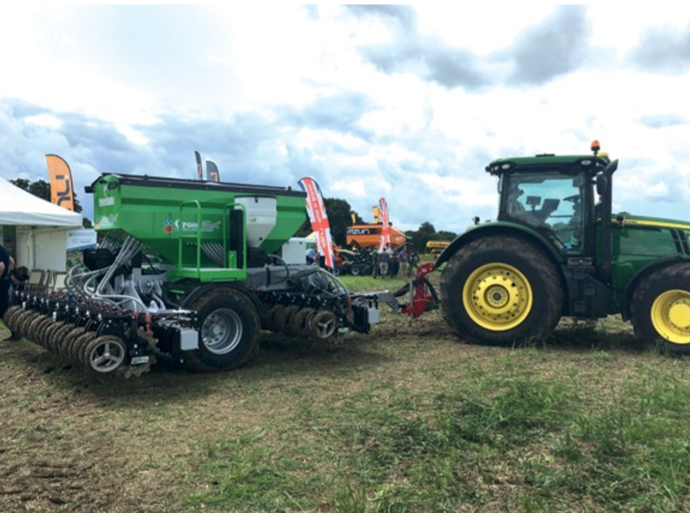

Prime West
Cross-slot technology emerged in New Zealand around 30 years ago, and has evolved through intense university research in both New Zealand and the USA. It has been field proven in more than 17 countries.
In concept, the technology allows farmers to place seeds and fertiliser very close together in an optimum environment to encourage seed germination and establishment, by using an ‘inverted T’ slot. In 2012 Primewest Limited built its first UK designed drill. Now 3m, 4m and 5m grain only drills are produced, large seed hoppers, hydraulic control systems and sophisticated electronics including ADF and memory valve functions complete the package, with liquid fertiliser and microgranular hoppers as optional extras.
The Technology
The key part of the technology is the Opener – the part of the machine that engages with the soil. A 22 inch diameter steel disc is supported in a parallel linkage. Each side of the disc is a cast iron blade; the blades are pressed against the disc by rubber pads. The blades are hollow, allowing seed or fertiliser to be blown down to the lower edge of the blade, where the small wing forms a horizontal slot in the soil. The depth of the Opener is controlled by two rubber tyres, negative air pressure press wheels, making the depth easily adjustable. The disc, press wheels and main pivot points are all supported on the same size taper roller bearing and sealed against contamination by a triple lip seal. Each opener is lifted in and out of work by a hydraulic ram, controlled by a memory valve, to ensure it is returned to the soil at the same pressure every time. The features of this opener make it unique with many advantages over its competitors.
The Environmental Benefits
The challenge to world agriculture over the next forty years is to increase output by 50%, whilst inputs are going to become more costly and limited. We must also produce a higher quantity of food whilst improving our soils and environment. True no-tillage can go some way to mitigating these problems. The most obvious savings are that of fuel and time. One fault in many soils is that they have become overworked, meaning it has been tilled too many times to produce a good seedbed.

Tilling has many detrimental effects; mixing air with soil accelerates the breakdown of organic matter. Organic matter is a key element of a fertile soil. Earthworms and other invertebrates feed on the organic matter and distribute it through the soil profile. Their burrows not only aerate the soil but provide channels that improve drainage, important when we are getting heavy rainfall events. A soil rich in organic matter can absorb more water, releasing it to plants when required but also helping to bind soil particles together, helping to prevent water runoff and soil erosion.
Soil is a very important natural resource, made up of a complex balance of microorganisms, which can easily be destroyed. By using true no-tillage we have the potential to manage and use soil properties more effectively. To achieve the highest return from this technology, and to keep the soil biology working, farmers need to change to adopt longer and more diverse rotations by using both winter and spring crops, cereal and broadleaf plants and cover crops wherever possible. The Openers allow crops to be established with the minimum of soil disturbance, this reduces weed emergence. This ultralow disturbance approach will in a very short period start to improve soil biology, releasing more nutrients to the crop. The savings in fuel and time are immediate but larger savings in agricultural chemicals and fertiliser applications soon emerge.
